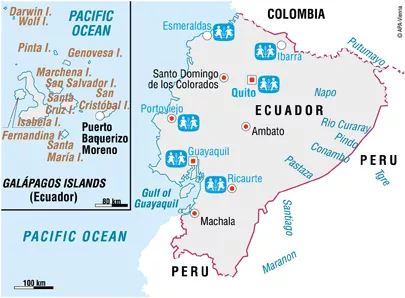
SOS relies on the kindness and generosity of Canadians to be able to provide a home for the most vulnerable children of around the world.
By becoming a child sponsor you are helping an individual child in need.
(You will receive a Canadian charitable tax receipt)
Please help us ensure a loving home for every child. Sponsor a child in South America now.
SOS Children's Villages in Ibarra
SOS Children’s Village has been working in Ibarra since 1979. Today, the social centre here provides a holistic and sustainable family strengthening programme that aims to alleviate hardship in the community in the long term. It includes a childminding programme, which allows single mothers to leave their children in safe hands while they are out working. There is also a day-care centre for younger children. In addition, the social centre provides preventive health care, as well as support for families in the community who are at risk of breaking up.

If children are no longer able to live with their parents, twelve SOS families can provide a loving home for up to 108 children. They live here with their brothers and sisters and are affectionately cared for by their SOS mothers.
When young people are ready to leave their SOS family in order to pursue further education or vocational training, the SOS Youth Programme makes shared accommodation available to them. With the support of qualified counsellors, they can plan their future, increasingly take responsibility and prepare for an independent life.
Poverty has been greatly reduced in Ecuador, but by no means has it been eradicated
Ibarra (Imbabura Province) has a population of around 140,000 and is located at 2,210 m above sea level in the northern Andes of Ecuador. It is referred to as the “white city” due to its colonial architecture. In addition, the beautiful landscape, culture, agreeable climate and friendly people make the city a popular tourist destination. It is the economic heart and a centre of education and science in northern Ecuador.
While poverty has been on the decline in Ecuador overall, in rural areas it still reaches levels of up to 53 per cent. This gives rise to a high rate of migration of the indigenous population from surrounding rural areas to Ibarra, where they seek work as porters, domestic workers or bricklayers. However, in many cases migration does not actually lead to an improvement in living standards for these people, as infrastructure and adequate housing are unavailable. In fact, in Imbabura, only around 20 per cent of houses fulfil basic standards of water supply and sanitation.
Children from disadvantaged households deserve a fair chance in life
Of course, children are the ones who suffer most from a precarious living situation, as it can severely affect their health and psychological development. Although national welfare initiatives are in place in Ecuador, in Imbabura province only 17.7 per cent of children in need benefit from child development programmes.
Racial prejudice is still a problem in the country. It affects many children and puts them at a grave disadvantage in life, both in terms of the education they are likely to complete, and as regards their future job prospects. In addition, poverty can lead to stigmatisation of children early on in life, and this burden can be hard to shake as adults. Many children also miss out on an education because they have to contribute to the family income. The efforts of SOS Children’s Villages are directed towards ensuring a stable home, healthy upbringing and education for children without parental care or at risk of losing it.
Our Impact
Image

SOS Social Centres in Ecuador aim is to help families, in particular women and children, living in communities neighbouring the SOS Children's Villages to gradually escape from poverty, and to help young people become self-reliant. |
2 SOCIAL CENTRES | 459 Beneficiaries |
Image
The SOS Children's Village in Ecuador provides loving homes to orphaned and abandoned children |
1 VILLAGES | 86 Orphaned and Abandoned Children |
Image
The SOS Youth Facilities in Ecuador provides youth with a loving environment where they learn to transition into independent living and to expand their education |
1 YOUTH FACILITIES | 37 Youths in our Care |
Our Impact

